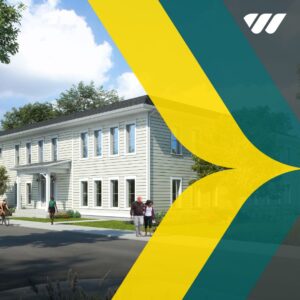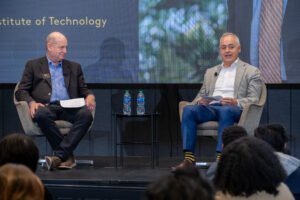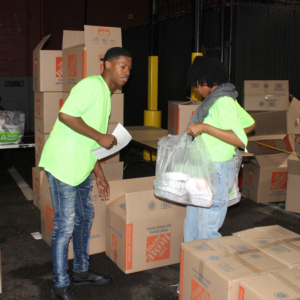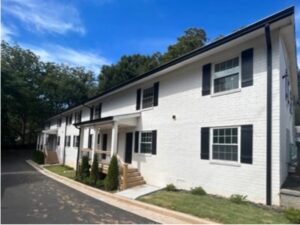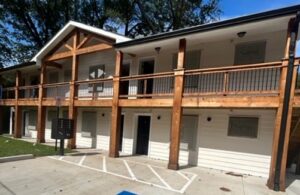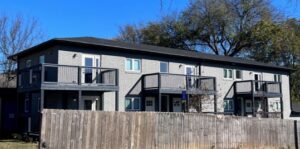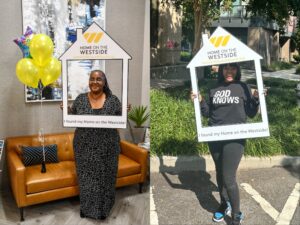Neighborhood residents, faith leaders, heads of nonprofits and corporate executives gathered together at the December 15 Transform Westside Summit to hear from Roz Brewer, former chief executive officer of Walgreens Boot Alliance and former chair of the Spelman College Board of Trustees. The Summit provided a unique opportunity for the audience to engage with Roz, who shared insights into her remarkable journey and her commitment to marginalized communities and inclusive workplaces.
Attendees had the opportunity to share resources for the group’s collective efforts to improve the Westside. Rev. Dr. Neichelle R. Guidry, dean of Sisters Chapel at Spelman College, led the devotion. John Ahmann, Westside Future Fund President and CEO, moderated the discussion.
Key Moments from the Conversation
Roz began by reflecting on her upbringing and the profound influence of her parents, George Gates and Sally Sty Gates, who migrated from the southeast to Detroit, Michigan and both worked in the auto industry. Raised in a family of five children, she emphasized the unwavering expectations her parents set for discipline and hard work. She recounted stories of her early years, highlighting the discipline instilled by her father’s encouragement to wake up early and the communal support she received from neighbors.
“My story is absolutely embraced in my parents and my upbringing. I can only tell my story if I talk about George Gates and Sally Sty Gates, my parents…Their expectations weren’t are you getting A’s or B’s they it was around discipline. We were the children that didn’t sleep past 6:30 a.m. My dad has this saying, ‘Do you know how long the white boy has been awake?’ He [believed] if you plan on getting ahead, you need to get up.”
Expressing her love for Atlanta, Roz, a Spelman College graduate, spoke about her decision to attend the college and the impact it had on her life. She credited Spelman for broadening her perspective on diversity within the Black community, shaping her into a well-rounded individual. Roz shared her experience as a student at Spelman and her commitment to giving back to the college, eventually becoming a trustee and chair of the board for 17 years.
“When I got to Spelman it helped me learn the diversity within the diversity because we are a broad breadth of people…Spelman exposed me to the world. Spelman is a place where you cannot leave there without developing your whole self because of sister accountability and you want to do well for your sisters and by them.”
The conversation delved into her corporate leadership roles at major companies, including Kimberly Clark, Walgreens and Starbucks. As the discussion shifted towards navigating predominantly white, male-dominated environments, Roz highlighted the importance of authenticity. She emphasized the need for women, especially in such environments, to resist assimilation, maintain self-awareness, and showcase their unique qualities. Roz stressed the significance of creating a vision, strategy and inspiring hope as a leader, fostering mutual respect and understanding.
“I didn’t feel good about myself until somebody would speak my name because you just want to be seen and heard. I didn’t need a big star on my forehead, I didn’t need anybody to come and bring me my coffee. I just wanted somebody to see that’s my work. I did it. I then began to get sponsorship from people who pulled me through, and I needed it.”
Addressing the challenges faced by women in male-dominated spaces, Roz encouraged them to persist, fight against assimilation, and seek spaces where they can be true to themselves. She underscored the value of self-awareness, both in understanding personal strengths and weaknesses and in building a support network.
“I know it might be hard not to assimilate because you will likely be the only woman in the room and you might pick up skill sets, tactics and even speaking language that’s not your natural language just to fit in. Fight that fight and as best as you can look at your best qualities and try to bring them forward. And feel OK about it. And when they are rejected, which they will be rejected at some point, then you make the decision that ‘maybe this isn’t the right place for me’ and find your space. Because there is a space there for sure.”
Miss the event? Watch the full Transform Westside Summit on YouTube.



